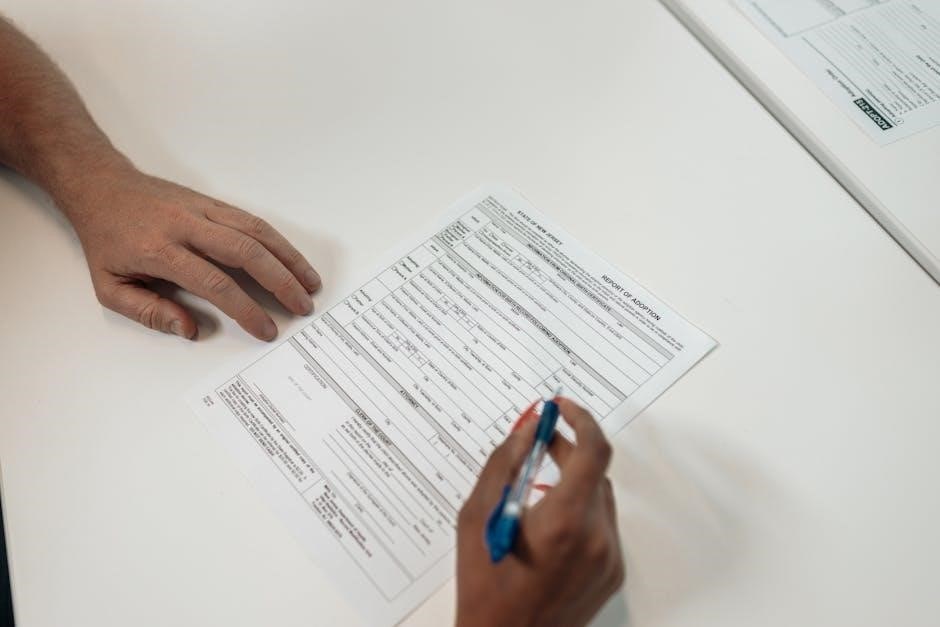hawaii power of attorney form pdf
The Hawaii Power of Attorney Form PDF is a legal document enabling residents to appoint an agent to manage their financial, medical, and property affairs effectively.
Overview of the Hawaii Power of Attorney
A Hawaii Power of Attorney (POA) is a legal document that allows individuals to appoint an agent to manage their financial, medical, or property affairs. It ensures continuity in decision-making when the principal is unable to act. The POA can be durable, remaining valid even if the principal becomes incapacitated, or limited to specific tasks and durations. This document is essential for safeguarding one’s interests and ensuring smooth handling of personal matters according to their wishes, following Hawaii’s legal framework and requirements.
Importance of Using a Power of Attorney Form in Hawaii
Using a Power of Attorney (POA) in Hawaii is crucial for ensuring continuity in decision-making when individuals are unable to act for themselves. It allows the appointment of a trusted agent to handle financial, medical, and property matters, aligning with the principal’s wishes. A POA is essential for avoiding legal complications and ensuring smooth management of affairs during incapacity. It also protects the principal’s autonomy and provides peace of mind, knowing their interests are safeguarded according to Hawaii’s legal framework and requirements.
Types of Power of Attorney Forms in Hawaii
Hawaii offers several types of Power of Attorney forms, including durable, general, limited, and medical, each tailored to specific needs and circumstances, ensuring flexibility and control.
Durable Power of Attorney Form
A durable Power of Attorney in Hawaii remains effective even if the principal becomes incapacitated, ensuring continuous management of financial, property, and asset matters. It is ideal for long-term planning and allows the designated agent to act on behalf of the principal in various legal and financial capacities. This form is revocable and provides robust legal protection, making it a popular choice for individuals seeking stability and security in their affairs. It is widely used for its enduring nature and flexibility in addressing complex situations.
General (Non-Durable) Power of Attorney Form
The General (Non-Durable) Power of Attorney Form in Hawaii grants an agent authority to act on behalf of the principal but only while the principal is mentally capable. It terminates automatically if the principal becomes incapacitated or revokes the document. This form is often used for specific, short-term tasks, such as managing financial transactions or handling real estate matters during the principal’s absence. It offers flexibility for temporary arrangements without the permanence of a durable power of attorney.
Limited Power of Attorney Form
A Limited Power of Attorney Form in Hawaii is tailored for specific tasks or situations, granting an agent restricted authority. It is commonly used for handling real estate transactions, managing financial affairs during the principal’s absence, or overseeing business operations. This form is ideal when the principal needs assistance for a limited time or purpose. Unlike durable or general POAs, its scope is narrow, and it automatically expires once the defined task is completed or the timeframe ends. It does not require notarization but is recommended for clarity and legal assurance.
Medical Power of Attorney Form
A Medical Power of Attorney Form in Hawaii allows individuals to designate an agent to make healthcare decisions on their behalf if they become incapacitated. This form ensures that the principal’s medical preferences are honored, including decisions about treatments, medications, and end-of-life care. It is activated only when the principal is unable to communicate their wishes. The agent must act in accordance with the principal’s instructions and best interests. This form is essential for safeguarding healthcare autonomy and ensuring seamless decision-making during critical situations.

Legal Requirements for Completing the Form
Completing the Hawaii Power of Attorney Form requires adherence to state laws, including proper signing, witnessing, and notarization to ensure validity and enforceability under Hawaii Revised Statutes.
Who Can Act as an Agent in Hawaii
In Hawaii, an agent must be at least 18 years old, possess legal capacity, and willingly accept the responsibility. The agent should be trustworthy and capable of acting in the principal’s best interests. They must also be available to manage the principal’s affairs effectively. The selected agent cannot be a minor or someone legally incapacitated. It is crucial to choose an agent who understands the responsibilities and can make decisions aligned with the principal’s wishes, ensuring proper management of financial, property, and healthcare matters as outlined in the power of attorney form.
Witness and Notarization Requirements
In Hawaii, a power of attorney form must be notarized to ensure its validity. The principal’s signature must be acknowledged by a notary public. While witnesses are not always mandatory, some forms may require one or more adult witnesses to sign the document. The notary public verifies the principal’s identity and capacity to execute the document. This process ensures the authenticity of the power of attorney and protects against fraudulent actions. Proper notarization is essential for the form to be legally binding in the state of Hawaii.

How to Complete the Hawaii Power of Attorney Form
Download the form, fill it out, designate your agent, specify powers, sign, and notarize. Keep a copy for your records and ensure compliance with Hawaii state laws.
Downloading and Accessing the Form
The Hawaii Power of Attorney form can be downloaded as a PDF from official state websites or legal resources. It is available in both standard PDF and fillable PDF formats, allowing users to complete it digitally before printing. Ensure the form is downloaded from a trusted source to comply with Hawaii’s legal requirements. Once downloaded, print the document on plain paper and fill it out by hand using black ink, as required by state guidelines. Keep a copy for your personal records after completion and execution.
Step-by-Step Instructions for Filling Out the Form
- Download and print the Hawaii Power of Attorney Form PDF from a trusted source.
- Read the instructions carefully before filling in the details.
- Enter your personal information, including your name, address, and date of birth.
- Specify the types of powers you are granting to your agent.
- Choose between durable, general, limited, or medical Power of Attorney.
- Provide your agent’s full name, address, and contact details.
- Sign the document in the presence of a notary public and witnesses.
- Ensure the agent and witnesses sign and date the form.
- Keep the original document in a secure location and provide copies to your agent and relevant parties.
Signing and Executing the Document
To finalize the Hawaii Power of Attorney Form PDF, the principal must sign the document in the presence of a notary public and two witnesses. The notary will verify the principal’s identity and confirm their willingness to execute the document. Witnesses must also sign and date the form, attesting that the principal acted voluntarily. Once executed, the document becomes legally binding, granting the agent authority to act on the principal’s behalf. Ensure all signatures are clear and witnessed properly for validity.

Common Mistakes to Avoid When Using the Form
Common errors include improper notarization, incomplete witness signatures, and unclear agent designations. Ensure the principal’s intent is explicitly stated to avoid legal disputes.
Errors in Agent Designation
One common mistake is designating an agent without ensuring they are trustworthy or capable of handling responsibilities. Failing to have the agent sign and date the form or not providing clear instructions can lead to disputes. Additionally, appointing multiple agents without specifying their roles may cause conflicts. It’s crucial to carefully select an agent and ensure their acceptance is properly documented to avoid legal complications and ensure the principal’s wishes are honored.
Incorrect Notarization Processes
Incorrect notarization processes can render a Hawaii Power of Attorney form invalid. Common errors include failing to have the document notarized, using incorrect notarial language, or neglecting to complete the acknowledgment section. Additionally, notarizing without the principal’s presence or failing to stamp and sign the form properly can lead to legal challenges. Ensuring the notarization process adheres strictly to Hawaii’s legal requirements is essential to maintain the document’s validity and enforceability. Proper notarization safeguards the principal’s interests and prevents potential disputes.

When to Use a Hawaii Power of Attorney Form
A Hawaii Power of Attorney form is essential for managing financial transactions, real estate matters, healthcare decisions, and planning for future incapacitation, ensuring affairs are handled smoothly.
Financial Management and Transactions
A Hawaii Power of Attorney form is crucial for managing financial matters, allowing the agent to handle paying bills, overseeing bank accounts, and conducting investment activities. It ensures smooth management of real estate transactions and property sales. The agent can also execute contracts, file taxes, and access safe deposit boxes. This authority is particularly vital if the principal becomes incapacitated, ensuring financial stability and continuity. The form is legally binding under Hawaii’s Uniform Power of Attorney Act.
- Paying bills and managing expenses.
- Overseeing bank accounts and investments.
- Conducting real estate transactions.
- Filing taxes and accessing safe deposit boxes.
Real Estate and Property Matters
A Hawaii Power of Attorney form empowers the agent to manage real estate and property matters, including buying, selling, or leasing property. It allows the agent to execute deeds, negotiate transactions, and handle title transfers. This authority is essential for maintaining property management continuity, especially if the principal is unable to act. The agent can also oversee property maintenance and address legal issues related to real estate, ensuring the principal’s interests are protected under Hawaii law.
- Buying, selling, or leasing property.
- Executing deeds and negotiating transactions.
- Handling title transfers and property maintenance.
- Addressing legal issues related to real estate.
Healthcare and Medical Decisions
A Hawaii Power of Attorney form allows an agent to make healthcare and medical decisions if the principal becomes incapacitated. This includes consenting to treatments, managing end-of-life care, and accessing medical records. The agent must act in the principal’s best interests and adhere to their wishes as outlined in the document. This authority is vital for ensuring continuity in medical care and respecting the principal’s preferences under Hawaii’s Uniform Power of Attorney Act.
- Making healthcare decisions on behalf of the principal.
- Consenting to or refusing medical treatments.
- Managing end-of-life care and directives.
- Accessing medical records and communicating with healthcare providers.
Frequently Asked Questions About the Form
This section addresses common inquiries about the Hawaii Power of Attorney form, including its validity, creation, and revocation, providing clarity for users.
Can I Create My Own Power of Attorney Form?
Yes, you can create your own Power of Attorney form in Hawaii, but it is highly recommended to use a template that complies with state laws. The form must include specific powers, signatures, and witness requirements. While drafting your own form is possible, consulting an attorney ensures legality and accuracy. Hawaii Revised Statutes, particularly the Uniform Power of Attorney Act, outline the necessary components. Templates are widely available online, but legal advice is advised for complex situations to avoid errors.
Is a Power of Attorney Form Valid Across State Lines?
A Hawaii Power of Attorney form is generally valid across state lines due to the Uniform Power of Attorney Act, which most states, including Hawaii, have adopted. This means other states typically recognize and honor a Hawaiian POA, provided it meets legal requirements. However, some states may have additional rules or exceptions. To ensure smooth recognition, it’s wise to consult an attorney, especially if the POA will be used in another state, to confirm compliance with local laws and avoid potential issues.
How Can I Revoke a Power of Attorney in Hawaii?
A Power of Attorney in Hawaii can be revoked by the principal through a written revocation document. The principal must sign the revocation, preferably in the presence of a notary public, and deliver it to the agent. It is also advisable to notify any institutions or parties involved in the agent’s actions. The revocation becomes effective when the agent receives it. The principal retains the right to revoke the POA at any time, as long as they are mentally competent. Specific procedures may vary based on the terms outlined in the original document.
The Hawaii Power of Attorney Form PDF is a vital legal tool for managing financial, medical, and property matters. It ensures your wishes are respected and executed efficiently.
Final Thoughts on Using the Hawaii Power of Attorney Form
Using the Hawaii Power of Attorney Form PDF is a practical and essential step for ensuring your financial, medical, and property matters are managed according to your wishes. It provides clarity and security, allowing you to appoint a trusted agent to act on your behalf. Proper execution, including notarization and witness signatures, is crucial for its validity. This document offers flexibility and peace of mind, making it a vital tool for planning your future effectively in Hawaii.